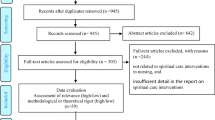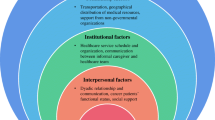Abstract
Objective: This article aimed to investigate the needs of caregivers of patients with palliative neurological problems and contribute to the solution proposals. Material-method: Phenomenological research design, a qualitative research design, was used in the study. The article was conducted with 16 relatives of patients with palliative neurological problems. The interviews were conducted using face-to-face in-depth semi-structured interview form. Colaizzi’s phenomenological analysis method used for the analyse. Results: In the analysis of the data, three categories, eight main themes, and seventeen sub-themes emerged. As a result of the interviews with the participants, the category of the effect of neurological palliative disease on the quality of life of individuals was gathered under three main themes, namely mental, physical, and social effects, and in the process of co** with the disease requiring neurological palliative care, two main themes were identified as emotion-focused co** and problem-focused co**. Conclusion: It was concluded in our study that having a patient in palliative care has psychological, social, and physical effects on the relatives of the patients. The burden of caregiving mostly affects the relatives of patients negatively. Relatives of patients mostly need time for themselves, moral support, and companion support.
Similar content being viewed by others
Data Availability
All data generated or analyzed during this study are included in this published article and its supplementary information files.
References
Akbulut Şahin, E. (2019). The difficulties of being a relative of the patient and religious co** (Palliative care service oncology patient relatives) (Master’s thesis, Institute of Social Sciences).
Atagün, M., Balaban, Ö. D., Atagün, Z., Elagöz, M., Özpolat, & AY. (2011). The Burden of the Caregiver in Chronic Diseases. Current Approaches in Psychiatry, 3(3), 513–552.
Bag, B. (2012). Palliative care practices in the health system in the case of Germany. Turkish Journal of Oncology/Turkish Journal of Oncology, 27(3), 142–149.
Başdinç, Ş. E. (2019). The Burden of Caregiving and Psychosocial Needs of Relatives of Patients Hospitalized in Palliative Care. Unpublished master’s thesis, Istanbul University.
Büyüköztürk, Ş., Kılıç Çakmak, E., Akgün, Ö. E., Karadeniz, Ş., & Ve Demirel, F. (2018). Scientific Research Methods. Ankara: Pegem Academy.
Canim, F. (2022). Psycho-Social Problems and Needs of Families with Patients in Palliative Care Unit. Master Thesis, Hacettepe University Institute of Social Sciences Department of Social Work, Ankara, 2022.
Colaizzi, P. (1978). Psychological research as a phenomenologist views it. In: Valle, R. S. & King, M. (1978). Existential Phenomenological Alternatives for Psychology. Open University Press: New York.
Erdoğan, S., Nahcivan, N., Esin, N., Coşansu, G., & Seçginli, S. (2014). Research in Nursing. Istanbul: Nobel Medicine Bookstore.
Guo, P., Pinto, C., Edwards, B., Pask, S., Firth, A., O’Brien, S., & Murtagh, F. E. (2022). Experiences of transitioning between settings of care from the perspectives of patients with advanced illness receiving specialist palliative care and their family caregivers: A qualitative interview study. Palliative Medicine, 36(1), 124–134.
İlhan, H. (2018). The effect of burnout levels on the social lives of caregivers of palliative care patients.(Unpublished Master’s Thesis). Tokat Gaziosmanpasa University, Institute of Health Sciences, Tokat.
Kabalak, A., Öztürk, H., Erdem, A. T., & Akın, S. (2012). Comprehensive Palliative Care Center Application at Ulus State Hospital. Journal of Contemporary Medicine, 2(2), 122–126.
Kabalak, A. A. (2014). Palliative Care in Turkey; 2014, Current Developments. Requirements Journal of Anesthesia, 22(3), 121–123.
Karakartal, D. (2017). Examination of the Problems Experienced by the Relatives of the Patients Who Care for the Cancer Patient During the Treatment Process. International Journal of Humanities and Education, 3(2), 96–109.
Kocakafa, G. E. (2019). Determination of Caregiving Burdens of Patient Relatives Who Provide Care to Inpatients in the Palliative Care Unit (Doctoral dissertation, Marmara University (Turkey).
Menekli, T., Dolu, S., Coşkun, Ö., & Torun, M. (2021). Views Of Palliative Care Patients, Relatives And Nurses On Good Death. Anatolian Journal Of Nursing And Health Sciences, 24(1), 84–94.
Morrow, R., Rodriguez, A., & King, N. (2015). Colaizzi’s descriptive phenomenological method. The Psychologist, 28(8), 643–644.
Onat Kaya, H., & ve Çelik, Y. (2018). The Burden of Patient Care: A Study among Caregivers of Alzheimer’s Patients. Dec. Hacettepe Journal of Health Administration, 21(4), 625–640.
Özdemir, M. (2010). Qualitative Data Analysis: A Study on Methodology Problematics in Social Sciences. Eskisehir Osmangazi University Journal of Social Sciences, 11(1), 323–343. Retrieved from https://dergipark.org.tr/tr/pub/ogusbd/issue/10997/131612
Özdemir, F. (2016). Investigation of the relationship between psychosocial problems experienced by relatives of patients receiving palliative care and religious co** styles (Master’s thesis, Istanbul Medipol University Institute of Health Sciences). Dec.
Özhan, E. (2019). Evaluation of Psycho-Social Status of Relatives of Cancer Patients: The Case of Eyupsultan State Hospital Palliative Care Center. Unpublished master’s thesis, Sakarya University.
Tong, A., Sainsbury, P., & Craig, J. (2007). Consolidated criteria for reporting qualitative research (COREQ): A 32-item check list for interview sand focus groups. International Journal for Quality in Health Care, 19(6), 349–357. https://doi.org/10.1093/intqhc/mzm042
Turgut, A., & ve Soylu, G. (2020). A qualitative study with relatives of palliative care patients. Society and Social Work, 31(2), 460–476.
WHO (2018). Definition of Palliative Care. Access: http://www.who.int/cancer/palliative/definition/en/. Access date: 15.11.2021.
World Health Organization. (2022) Palliative care. Available from: http://www.whoint/cancer/palliative/definition/en/index
Willig, C. (2013). Introducing qualitative research in psychology (3rd ed.). Open University Press.
Yıldırım, A., & Şimşek, H. (2011). Qualitative Research Methods in Social Sciences (8th edition). Ankara: Seçkin Publishing House.
Yıldırım, A., & Şimşek, H. (2016). Qualitative research methods in social sciences (10th ed.). Seçkin Publishing.
Yıldırım, A., Bayram., A., & Turan, T., G (2020). Intensive care, Timing for Neurological Diseases and Palliative Care. Selcuk Med J, 36(1), 1–5.
Acknowledgements
This research was supported by the Gümüşhane University Scientific Research and Publication Ethics Committee. Thanks for the support of the participating caregivers. The study was carried out under the principles of the Declaration of Helsinki. This study was supported by the Gumuşhane University Scientific Research and Publication Ethics Committee. We would like to thank caregivers for their support.
Funding
The study did not receive any financial support or relationships that may pose potential conflict of interest.
Author information
Authors and Affiliations
Contributions
The authors share the responsibility for the manuscript. Conception and design: NU, HA, SU, NK; data collection: HA, AG; analysis and interpretation: SU,NK,HA,NU, and manuscript writing: SU,HA,NK,NU,AG.
Corresponding author
Ethics declarations
Declarations of Conflict of interest
The authors declare no conflict of interest. The study did not receive any financial support or relationships that may pose potential conflict of interest.
Additional information
Publisher’s Note
Springer Nature remains neutral with regard to jurisdictional claims in published maps and institutional affiliations.
Electronic supplementary material
Below is the link to the electronic supplementary material.
Rights and permissions
Springer Nature or its licensor holds exclusive rights to this article under a publishing agreement with the author(s) or other rightsholder(s); author self-archiving of the accepted manuscript version of this article is solely governed by the terms of such publishing agreement and applicable law.
About this article
Cite this article
Ulutaşdemİr, N., Ay, H., Göçmen, A. et al. Needs of caregivers of patients with palliative neurological problems: a qualitative study. Curr Psychol 42, 8471–8477 (2023). https://doi.org/10.1007/s12144-022-03800-w
Accepted:
Published:
Issue Date:
DOI: https://doi.org/10.1007/s12144-022-03800-w




